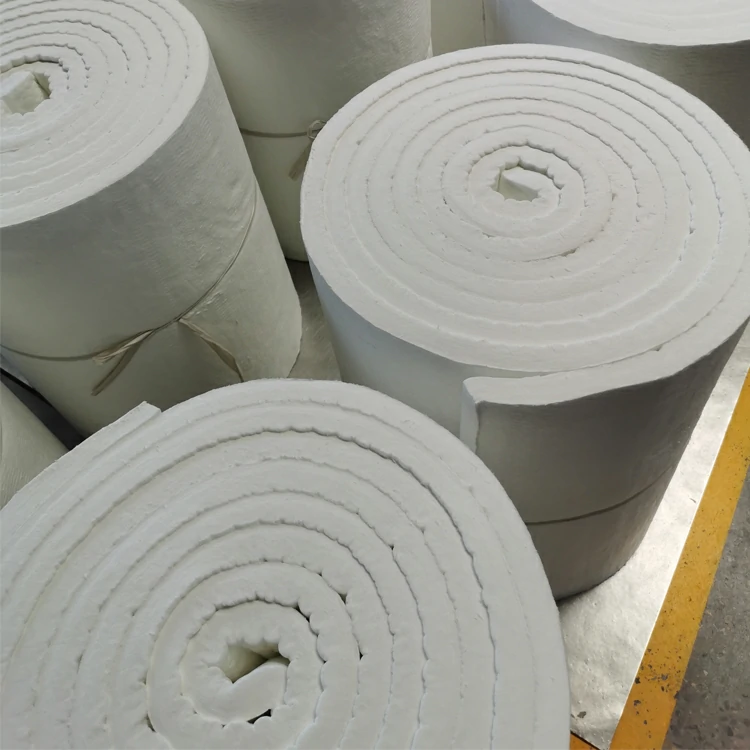Ceramic fiber insulation, such as the 1430C Ceramic Fiber Felt, has gained significant popularity in various industries due to its exceptional thermal insulation properties. This lightweight and versatile material offer numerous benefits, including high-temperature resistance, energy efficiency, durability, and cost-effectiveness. In this article, we will explore the benefits of ceramic fiber insulation, focusing on the advantages offered by the 1430C Ceramic Fiber Felt.
Superior Thermal Insulation
- High-Temperature Resistance:
Ceramic fiber insulation, including the 1430C Ceramic Fiber Felt, exhibits exceptional resistance to high temperatures, making it suitable for applications in industries such as metallurgy, petrochemicals, and power generation. It can withstand temperatures up to 1430°C (2606°F) without compromising its thermal insulation properties. - Low Thermal Conductivity:
Ceramic fiber insulation effectively minimizes heat transfer due to its low thermal conductivity. This property helps to reduce energy loss, improve energy efficiency, and maintain stable temperatures in various industrial processes. It contributes to cost savings and enhances the overall performance of heating systems.
Energy Efficiency and Cost Savings
- Reduced Heat Loss:
The excellent thermal insulation properties of ceramic fiber insulation result in reduced heat loss from industrial equipment, furnaces, and piping systems. By minimizing heat dissipation, it allows for better control of temperatures, leading to energy savings and reduced operational costs. - Quick Heat-Up and Cool-Down:
Ceramic fiber insulation has low heat storage capacity, enabling rapid heat-up and cool-down cycles. This characteristic is advantageous in applications where quick temperature changes are required, such as in heat treatment processes. It enhances operational efficiency and reduces cycle times.
Lightweight and Versatile
- Lightweight Construction:
Ceramic fiber insulation, including the 1430C Ceramic Fiber Felt, is lightweight, making it easier to handle and install. Its lightweight nature reduces the load on structures and equipment, providing flexibility in design and construction while maintaining structural integrity. - Versatile Applications:
Ceramic fiber insulation can be used in a wide range of applications. It is commonly employed in furnace linings, kilns, boilers, and thermal equipment. Its versatility allows for customization to meet specific requirements, providing effective insulation solutions across various industries.
Durability and Longevity
- Excellent Thermal Stability:
Ceramic fiber insulation demonstrates exceptional thermal stability, even when exposed to high temperatures over extended periods. It can withstand thermal cycling and sudden temperature changes without compromising its insulation properties, ensuring longevity and reliability in demanding industrial environments. - Resistance to Chemicals and Corrosion:
Ceramic fiber insulation resists chemical attack and corrosion from various substances, including acids, alkalis, and solvents. This resistance enhances its suitability for applications in chemical processing, refining, and other industries where exposure to corrosive environments is prevalent.
Fire and Sound Resistance
- Fire Resistance:
Ceramic fiber insulation offers excellent fire resistance properties, providing an added layer of safety in industrial settings. It does not contribute to the spread of flames and helps to inhibit fire propagation, protecting personnel, equipment, and structures. - Sound Absorption:
Ceramic fiber insulation also exhibits sound absorption properties, reducing noise levels in industrial environments. It contributes to a safer and more comfortable working environment for personnel and helps meet regulatory requirements for noise control.
Ceramic fiber insulation, such as the 1430C Ceramic Fiber Felt, offers a multitude of benefits in terms of thermal insulation, energy efficiency, durability, and versatility. Its high-temperature resistance, low thermal conductivity, lightweight construction, 1430C Ceramic Fiber Blanket Ceramic Fiber Insulation and resistance to chemicals and corrosion make it an ideal choice for various industries. By utilizing ceramic fiber insulation, businesses can enhance their operational efficiency, reduce energy consumption, ensure safety, and achieve long-term cost savings.
